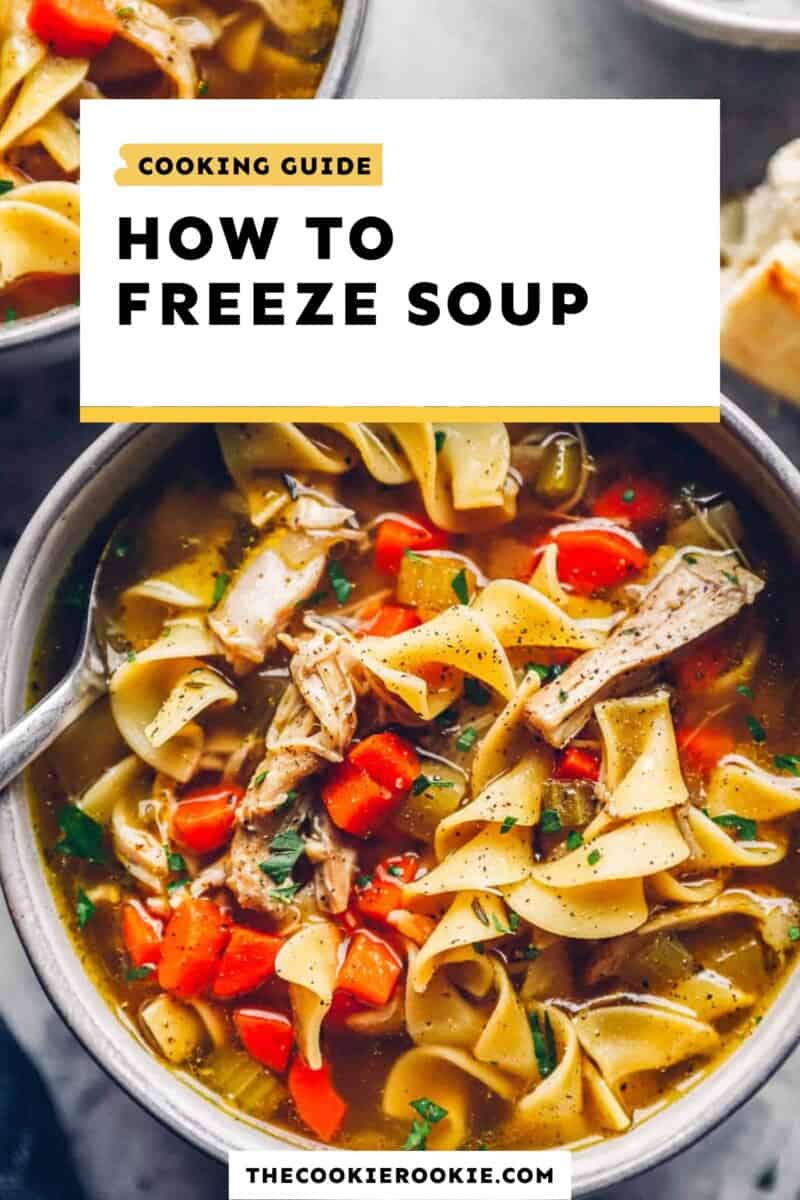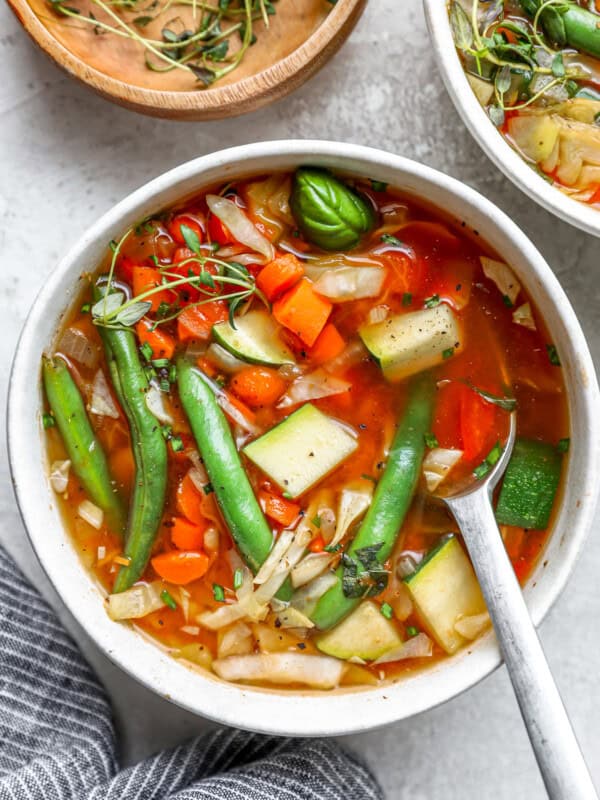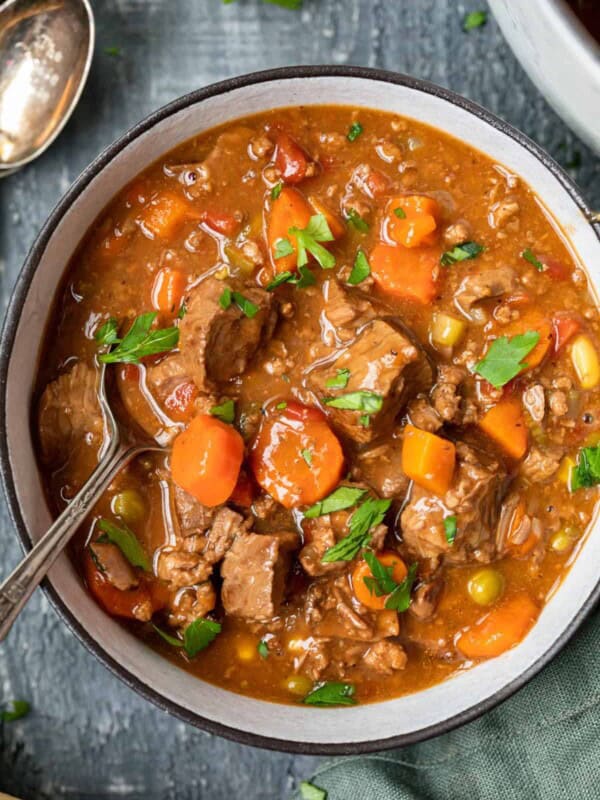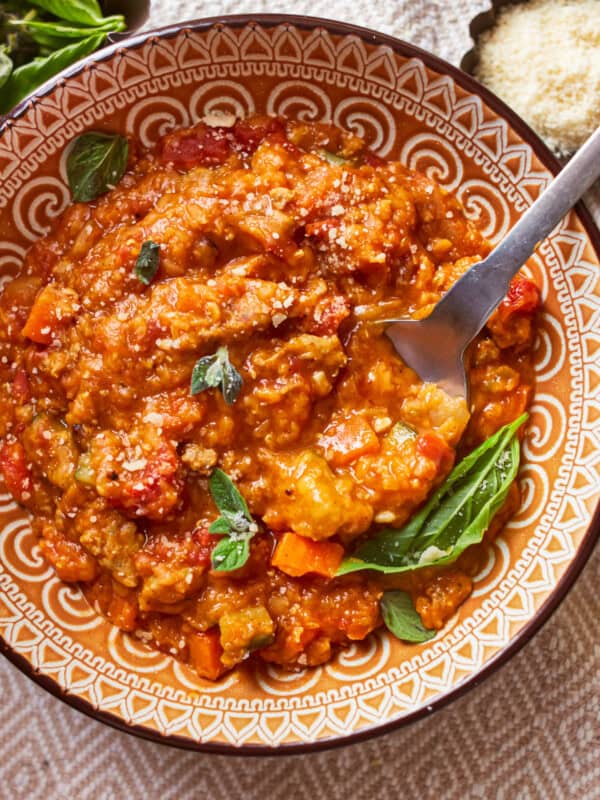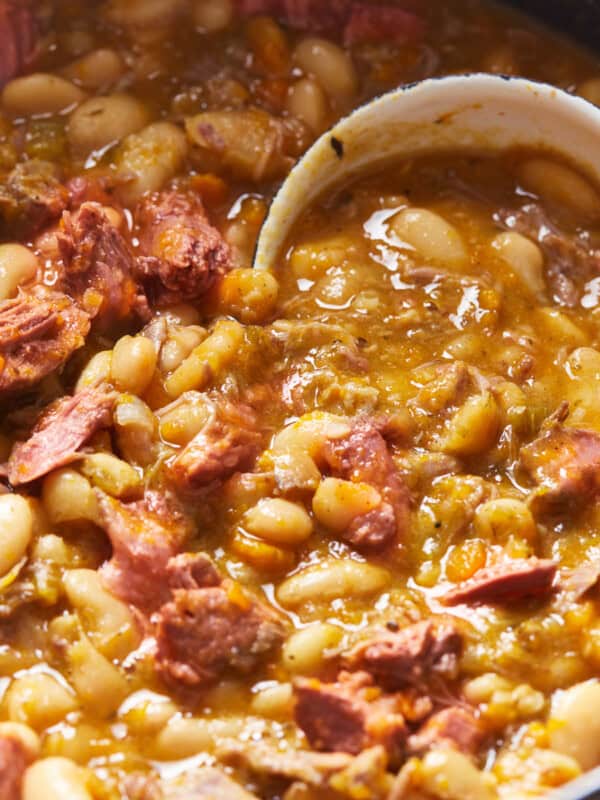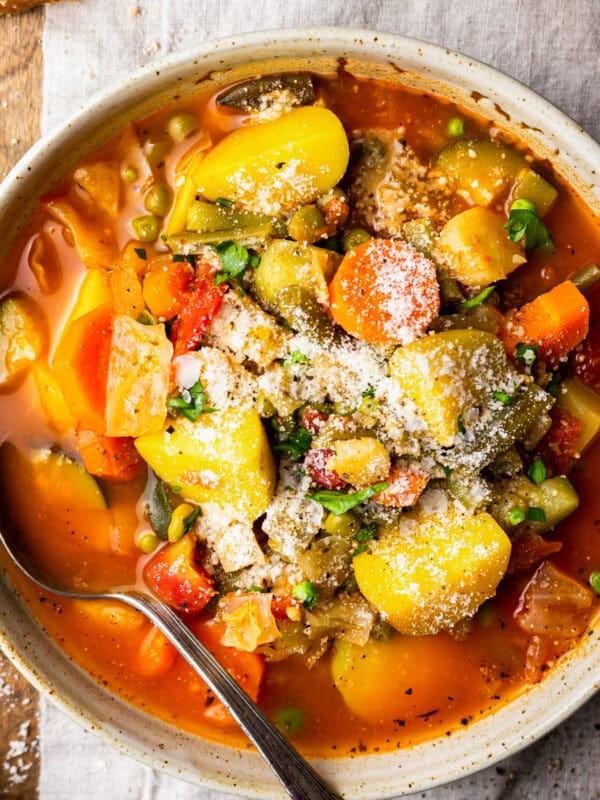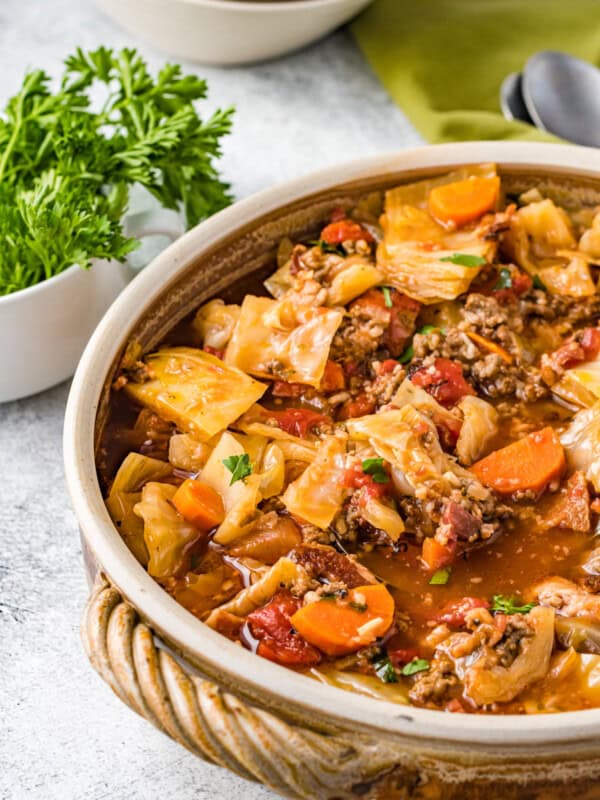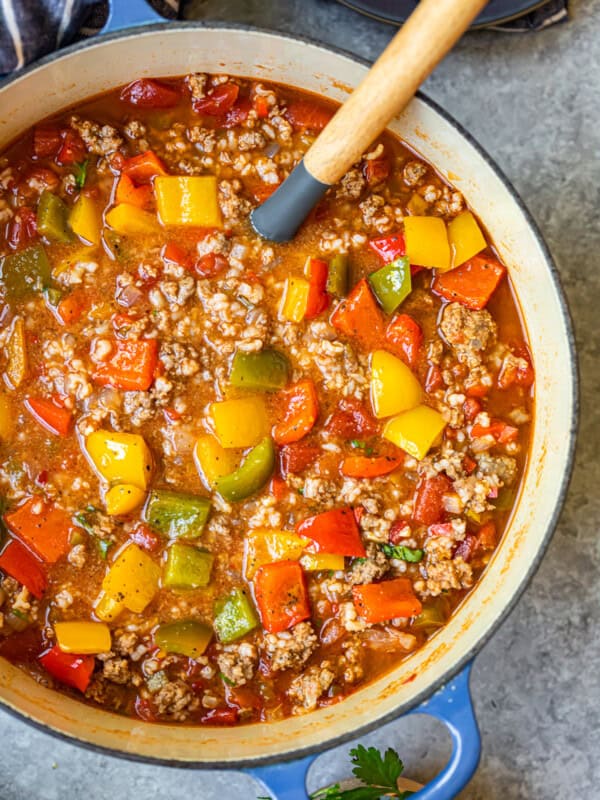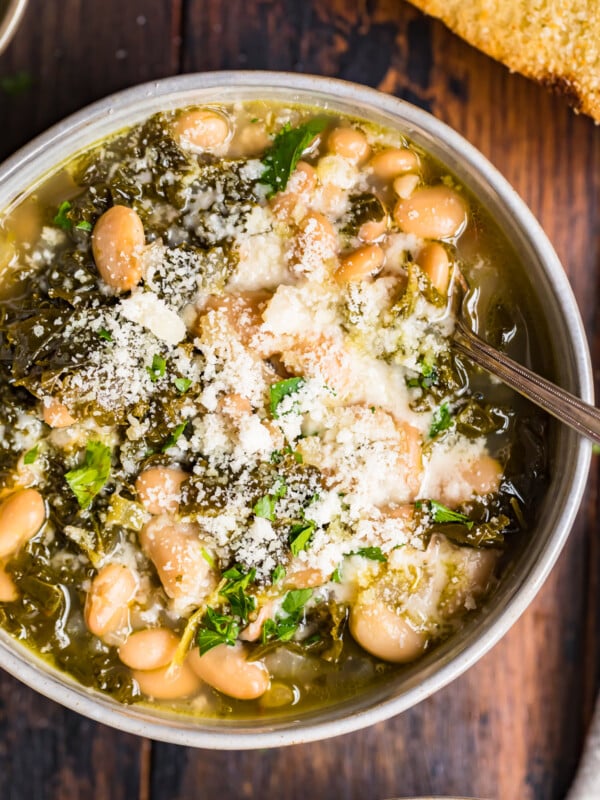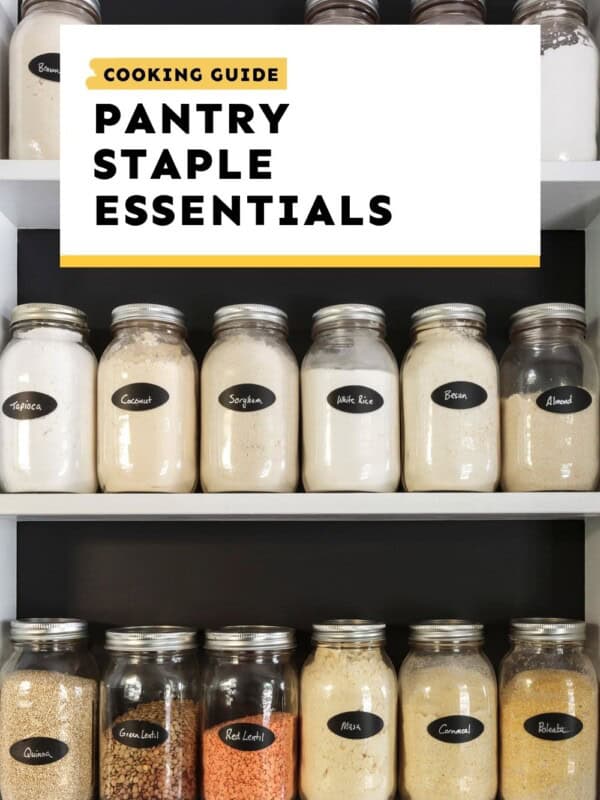Freezing soup is one of my favorite hacks for meal prep, especially during the winter season. Learn how to freeze soup the right way (step by step) for long-term storage, and I’ll tell you how to thaw and reheat your frozen soups too! Finally, to make life truly easy, I’m sharing my favorite freezer-friendly soup recipes, and some tips for the ingredients that don’t freeze so well.
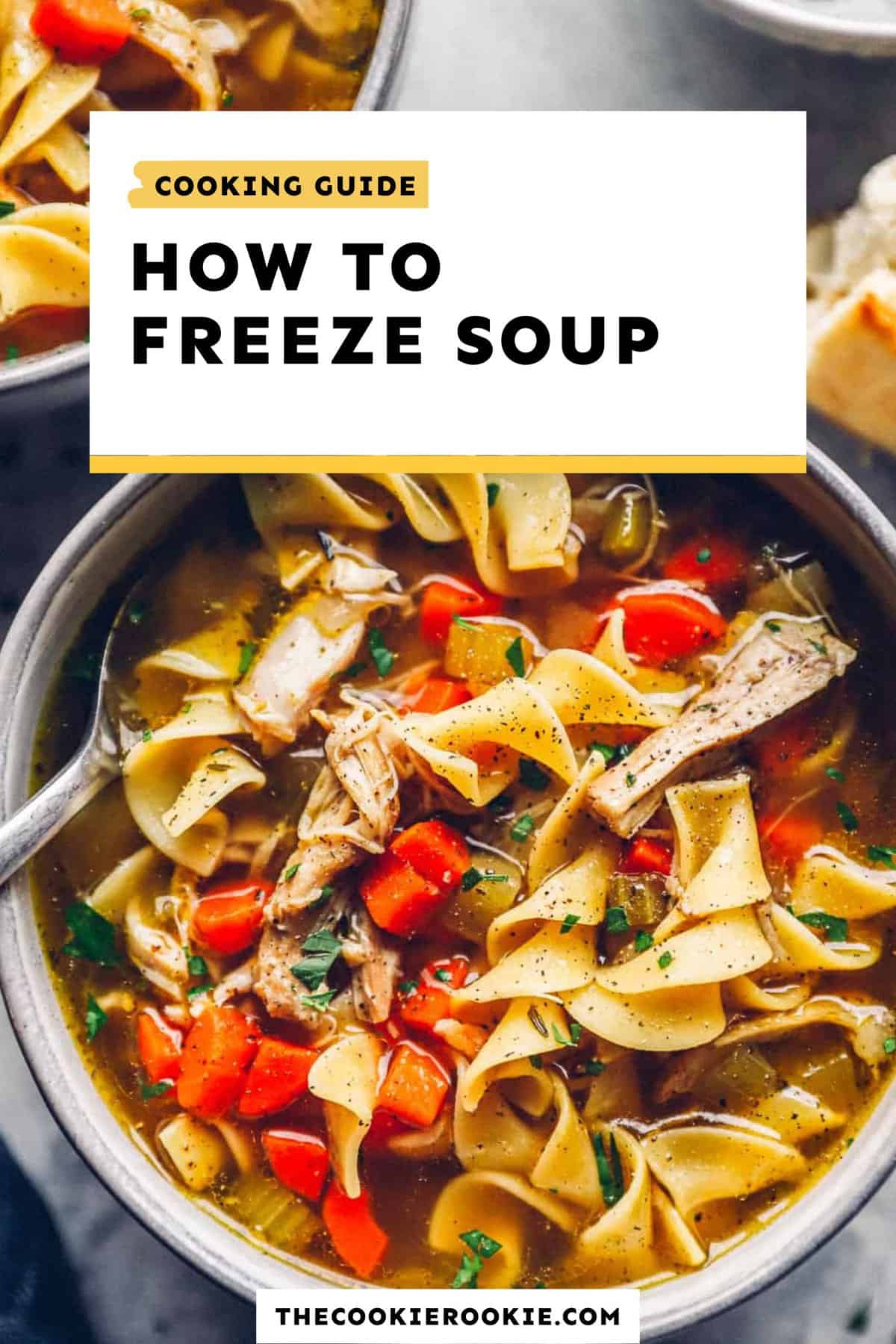
This post may include affiliate links that earn us a small commission from your purchases at no extra cost to you.
What’s the best way to freeze soup?
There’s nothing I love more for a cozy winter dinner than a bowl of warm soup. Even better is preparing big batches of soup to freeze, so that I have some easy freezer meals ready for weeks or months ahead of time! It’s great for meal prep, and you’ll be thanking yourself later on when you have those soups ready to go.
I’m sharing a step by step guide on exactly how to freeze soup, all my best tips for freezing soups, and a list of soups that freeze well. And for all the soup ingredients that don’t freeze so well? Well, I have a tip for you to solve that problem!
So make a batch of that healthy soup, a hearty chili, or any comforting soup you love, and learn how to store it, thaw it, and reheat it.

How to Freeze Soup (Step by Step)
Whether you’re cooking a big batch of soup to freeze for easy meals, or just saving those leftovers, this step by step will show you the best way to freeze soup so that it lasts long-term.
1. Cook the Soup
- Make the soup recipe of your choosing according to instructions.
- If you’re planning to freeze the soup, double the batch (if you want) so you have some for now and lots for later. Cook once and eat for months!
- Remember to leave out any dairy, pasta, or potatoes if you’re not eating the soup right away. They don’t freeze well, so it’s best to make the soup without these ingredients, then add them in later when you reheat the soup. (More on what not to freeze, and how to reheat, below.)
2. Let the Soup Cool
- Remember: soup should be fully cooled before freezing. If it’s still warm, it will affect the temperature of your freezer.
- Give it about 30 minutes to cool at room temperature before refrigerating.
- Then place it in the refrigerator until fully cooled, up to a full day.
- Another way to cool soup is to give it an ice bath. Pour it into a container (or keep it in the soup pot) and then place it in a larger container (or use your sink) of ice. This will cool it down quickly without having to set it in the fridge overnight.
3. Pour Soup into Freezer-Safe Containers
- Once it has cooled, pour soup into containers.
- Use any airtight, freezer-safe containers for soup. You can use plastic or glass, as long as it has a tight-fitting lid.
- Another great option is zip-top or resealable bags. Pour soup carefully into bags, seal shut, then lay bags of soup flat.
- Be sure to leave a couple inches of space at the top of each container. Liquid expands when frozen, so you don’t want to overfill.
- I recommend portioning soup out before freezing. That way you can grab one bag or container of soup to reheat at a time, and the rest will stay frozen until you need it.
- You can place a layer of plastic wrap directly over the top of the soup, under the lid (if using containers, not bags) to help prevent freezer burn.
4. Label Container of Soup Before Freezing
- Always label your food before freezing, otherwise you might end up with a lot of leftover soup in your freezer and forget what it is or how long it’s been there.
- Freezer-proof tape and a permanent marker work great for labeling.
- Label each container with a brief description of what’s inside (like the name of the soup recipe). Include the date you made it, and ideally the date to eat by. This will also make cleaning out your freezer much easier in the future.
5. Freeze Soup for 3 Months
- Once your soup has been cooled, separated into containers, and labeled, it’s time to freeze!
- If freezing in bags, I recommend laying them flat on a baking tray. Let them freeze overnight and then you can go back and rearrange your flat bags of soup. This protects your freezer from the possibility of broken bags and spilled soup.
- If freezing in other containers, just stack and organize as you prefer to let them freeze.
- Most soups will last in the freezer up to 3 months (for best quality). Remember to always follow food safety guidelines when storing leftovers!
Now that you have some frozen soups ready to eat any time you need a quick meal! Check below for info on defrosting and reheating your soup, some more tips, and freezer-friendly soups.
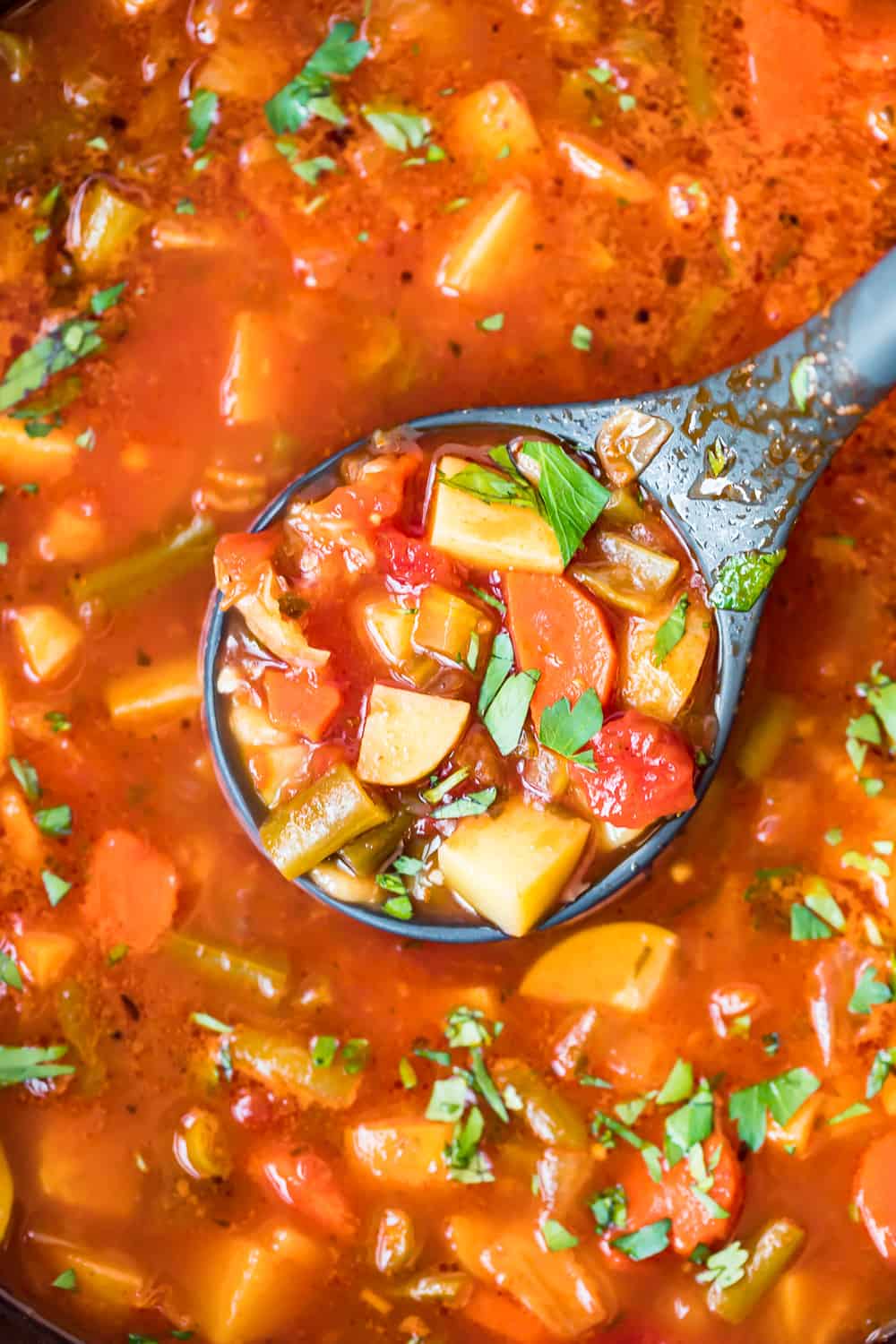
What soups freeze well?
Soups with a simple broth base are best for freezing. The thicker and creamier the soup, the harder it’s going to be to retain the consistency after reheating. Heartier soups loaded up with sturdy ingredients–like beans, some rice and vegetables, meats and protein–are all good recipes to freeze as well.
That’s why things like chicken broth, mushroom soup, minestrone, and chili recipes generally freeze so well!
What soups don’t freeze well?
Deciding whether a soup will freeze well or not depends on the ingredients. There are 3 main things that don’t freeze well: pasta/noodles, dairy, and potatoes/starch. If your soup contains any of these, you CAN freeze it, but the quality, texture, and flavor of it might be a bit off when reheating it. I have a way to get around that below!
No-Freeze Soup Ingredients List:
- Dairy: Dairy generally does not freeze well. Any kind of cream (like heavy cream), milk (even dairy-free milks), or cheese in your soup might have a weird texture after reheating. The dairy ingredients tend to become grainy, and cream-based soups will separate.
- Potatoes: Potatoes are generally quite starchy, so they are not a great option for freezing in soups. They will soak up moisture from the soup and fall apart as they reheat. This means, sadly, that potato soup is not ideal for freezing.
- Pasta & Noodles: Pasta, noodles, and some other grains don’t hold up in the freezer. They usually end up soggy or mushy after being reheated, especially pasta. Rice is hit or miss in my experience–I usually undercook it slightly if I know I’ll be freezing it.
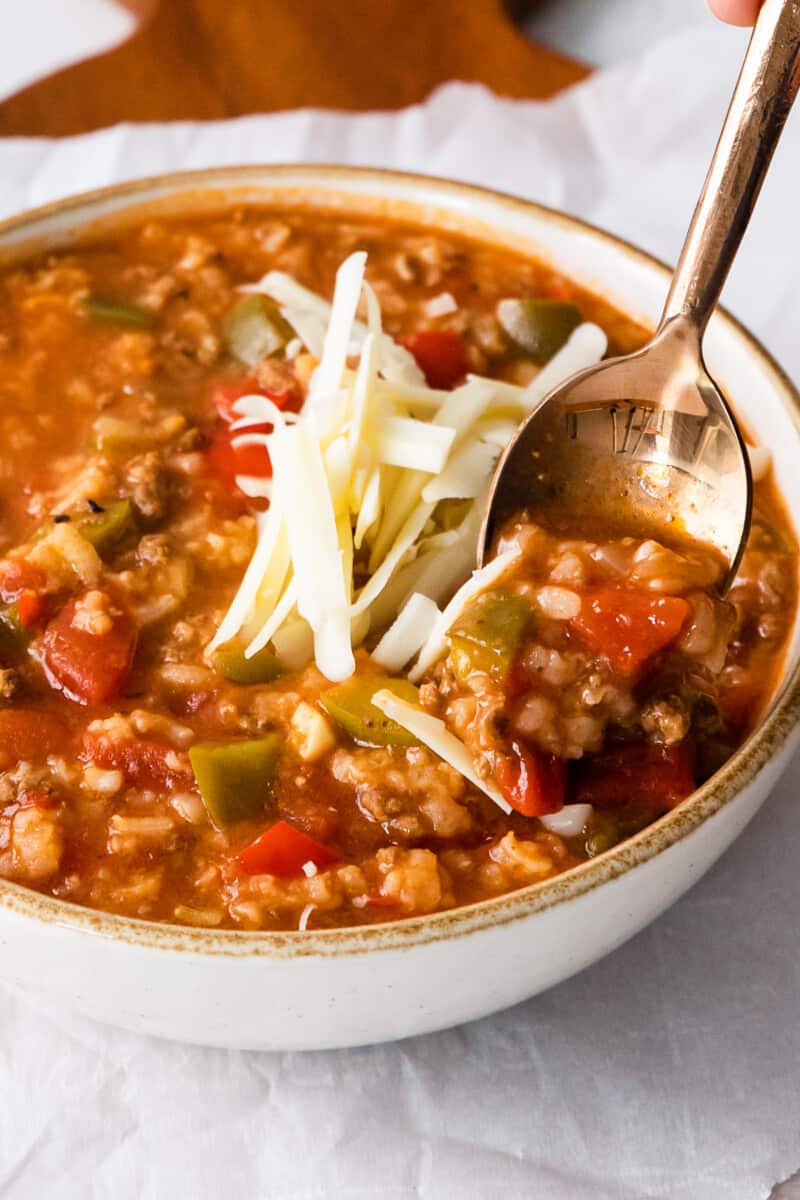
How to make (almost) any soup freezer-friendly
Okay, I know you want to freeze all of your favorite soup recipes, even the creamy ones filled with potatoes and cheese! So here’s my tip to get around the problem. If the soup you want to freeze includes any of the ingredients listed above, there is still hope!
Make the soup following the recipe as much as possible, but omit the ingredients that don’t freeze well. When you reheat the soup to eat, cook and add in the ingredients you skipped.
For example: leave out any noodles or dairy while preparing to freeze. When you reheat the soup, cook up the pasta or potatoes to add in, or stir in any cream or cheese.
It’s not full-proof, but this little tip makes almost any soup freezer-friendly!
Tips for Freezing Soup
Keep these quick tips and tricks in mind so you know how to freeze soup for safe keeping!
- Store soup in small family-sized or individual-sized portions. This will make the thawing and reheating process much easier. You’ll grab the perfect amount out of the freezer every time.
- Label everything! When you have a lot of leftovers and other foods in the freezer, it’s easy to forget what is what. Write a brief description of the soup and the date you make it/freeze it.
- Store flat in resealable bags to save space. Once it’s fully frozen, you can easily move it around as needed for organization.
- Skip ingredients that don’t freeze well (as listed above). If you know you’re making soup to freeze, leave out anything that won’t freeze well. You can add the remaining ingredients in when you reheat the soup to eat.
- Let soup cool completely before freezing. Don’t put hot soup in the freezer because it will raise the temperature of the freezer (and the rest of the food). Let it cool in the fridge overnight if needed.
- Don’t overfill containers with soup! Leave some space in each container because the soup will expand when frozen.
- Slightly undercook veggies. They will continue cooking when you’re reheating your soup, so it’s best to undercook them a bit before freezing.

How to Thaw and Reheat Frozen Soup
When you’re ready to take your soup out of the freezer and eat it, here’s how to thaw and reheat. Plan ahead so you have time to thaw!
- Place a container of frozen soup in the refrigerator and give it a day or two to fully thaw.
- Pour thawed soup into a pot and place on the stovetop over medium heat. Simmer and stir until it’s evenly heated throughout.
- If you’re short on time, let soup thaw in the fridge as long as you can, then add partially-thawed soup to the pot. It will take longer to reheat, but overall it will reheat the same.
- I don’t recommend reheating straight from frozen, and I don’t recommend using the microwave to thaw. It will reheat more evenly when thawed in the fridge and heated on the stove.
- However, once thawed, you can reheat it in the microwave in 30 second intervals, stirring, until hot.
Best Soup Recipes to Freeze
Now that you know how to freeze soup, so here are some delicious soups that are perfect for freezing!
Of course! Some ingredients don’t freeze well, but for the most part, soups are a great thing to freeze and save to eat later.
This also depends on what ingredients you use, but most soups will keep in the freezer for about 3 months.
Any airtight container will work. I like using resealable bags, as mentioned above in the tips section. You can also use regular glass or plastic containers, as long as you have well-fitted lids.
Placing warm soup in the freezer can mess with the temperature of the freezer, affecting other foods. The quick temperature change (from hot to frozen) is also risky for food safety. It could also cause problems with containers and proper storage.
Now that you know how to freeze soup, you can make big batches to meal prep, prepare meals for a long winter of easy dinners, or just save that leftover soup to eat later. Enjoy!
Food Prep Guides
Find more tips and recipes to help you prepare food and meals ahead of time!
